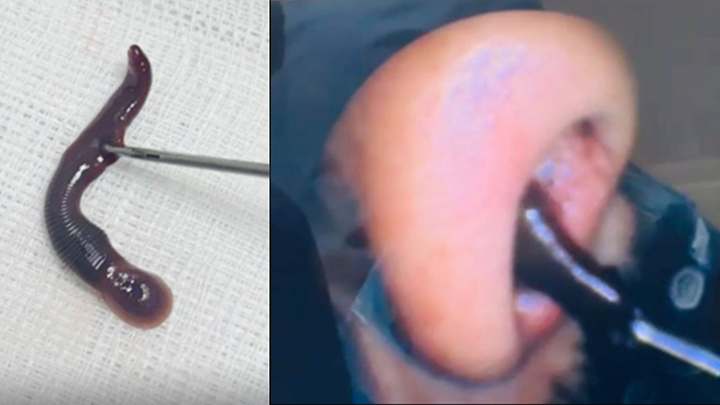JK News Today
The Department of Otorhinolaryngology (ENT) at the All-India Institute of Medical Sciences (AIIMS) Jammu, successfully performed a rare procedure by removing a live leech approximately 8 centimeters long from the nasal cavity of a young patient.
The patient, a 31-year-old male from Ramban, had been suffering from unilateral persistent epistaxis (nosebleeds) for the past 12 days — a condition that failed to respond to conventional treatment despite consultations at multiple healthcare facilities.
According to the ENT Department at AIIMS Jammu, the patient presented with a history of recurrent bleeding from one side of the nose. Initial examination revealed only active bleeding, but a subsequent detailed endoscopic evaluation performed by the ENT team revealed the presence of a live, blood-gorged leech firmly attached to the sphenoethmoidal recess (deep inside the nasal cavity).
The removal procedure was carefully performed under local anesthesia. The team used endoscopic instruments to grasp and extract the leech without causing further trauma to the delicate nasal mucosa. The leech, identified as belonging to the Hirudinea species, was successfully removed alive.
Dr. Darwin Kaushal, Head of the ENT Department, who oversaw the procedure, described the case as “extremely rare in urban medical centers.” The successful intervention was carried out with the dedicated support of Dr. Amardeep Singh, Dr. Pooja, Dr. Youshita, Dr. Shivane, Dr. Muskan, Dr. Gunjan and Dr. Bisna, along with nursing officers Ambika and Shivkaran.
“This patient presented with textbook symptoms of persistent bleeding, which is a key sign of parasitic infestation,” said Dr. Darwin Kaushal. “The leech had been inside the nasal cavity for nearly two weeks, continuously feeding and secreting its anticoagulant, hirudin, which caused the intractable nosebleeds. If left untreated, such a parasite can cause severe anemia and may migrate to the throat, lungs, or other vital structures, posing a life-threatening risk.”
The source of the infestation is suspected to be the use or consumption of non-potable water, often found in natural springs, ponds, or streams in hilly or rural areas. The ENT team strongly advises residents, especially those in peripheral and rural regions, to avoid drinking untreated water directly from natural sources.
Prof (Dr) Shakti Kumar Gupta, Executive Director & CEO of AIIMS Jammu, emphasized that this successful intervention underscores the institute’s cutting-edge diagnostic and surgical expertise in managing complex and rare medical emergencies. He highlighted that such cases, though extremely uncommon in urban medical centers, reflect the dedication and skill of the AIIMS Jammu team in delivering advanced patient care and ensuring timely, life-saving treatment.




